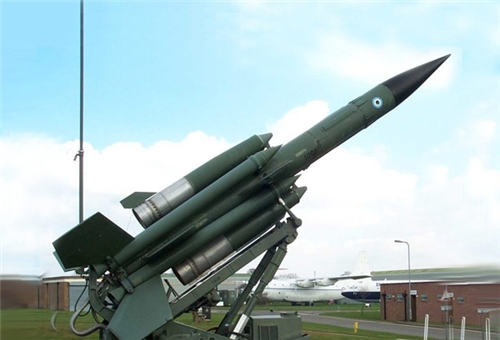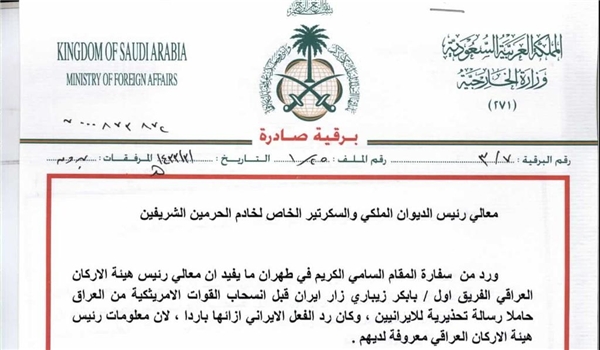Saudileaks: Docs Show Tehran’s Cold-Blooded Response to US Missile Threat

A US missile threat to Iran failed to intimidate or even move Tehran officials, shows one of the documents released by the Yemen Cyber Army after it hacked the Saudi Foreign Ministry in May.
The Saudi Foreign Ministry was hacked by the Yemen Cyber Army in May, and a copy of its information was sent to FNA and another one to the whistleblower website WikiLeaks.
One of the documents released by the YCA is a letter from the Saudi embassy in Tehran to the former Saudi Foreign Minister, Saud al-Faisal, in which the envoy informs Riyadh that the now former Iraqi Army Chief of Staff, Babaker Zebari, has traveled to Iran to deliver a message of threat from the US.
According to the cable, the Unites State had invited the now former Iraqi foreign minister, Hushyar Zebari, to visit a US Army Base in Qatar.
The letter says that the US army had even sent a plane to Baghdad to make sure that the Iraqi delegation would pay the visit.
The document says Zebari realizes the real intention behind the US invitation as soon as he arrives at the base, where the top US military commanders have given him a tour of their missiles all aimed at Iran and ready to launch, and then asked him to warn Tehran not to mess with their plans in the region following their complete pull-out from Iraq in December 2011.
The Iraqi foreign minister has apparently asked the country’s Army Chief of Staff Babaker Zebari to take the message to Iran.
“But, Zebari has been given a cold-blooded response in Tehran,” adds the letter.
“We already knew the direction of their missiles,” the Tehran officials have told the Iraqi top commander, according to the letter.
Late in May, the Yemen Cyber Army released a portion of the information and documents that it had gained in its recent cyber attack on Saudi Arabia’s Foreign, Interior and Defense Ministries.
The Yemen Cyber Army announced that it has hacked the website, servers and archives of Saudi Arabia’s Foreign, Interior and Defense ministries and would release thousands of these top secret documents.
The group claimed that it “has gained access to the Saudi Ministry of Foreign Affairs (MOFA) network and have full control over more than 3000 computers and servers, and thousands of users. We also have access to the emails, personal and secret information of hundreds of thousands of their staff and diplomats in different missions around the world”.
The hackers’ statement, which said the cyber army has also attacked the Saudi Interior and Defense ministries and vowed to release their details later, was carried by several globally known hackers websites.
Following the hack in May, the Yemen Cyber Army sent a copy of its information to FNA and another one to the whistleblower website WikiLeaks.
“WikiLeaks released over 60,000 documents on Friday and vowed to release the rest in coming weeks, but we plan to release the documents in separate news items since many of them contain the names of foreign nationals who have demanded visit to Saudi Arabia, for example for Hajj pilgrimage, and their names have been mentioned among the Saudi agents. Thus releasing the list of names and documents might hurt innocent individuals who have done nothing, but applied for visa at a Saudi embassy for doing Hajj pilgrimage,” FNA English Editor-in-Chief Seyed Mostafa Khoshcheshm said.
“The number of the documents is way beyond the 500,000 that has been announced by WikiLeaks, but they need to be checked first to make sure that they do not contain misleading information and are not harmful to innocent people,” he added.








